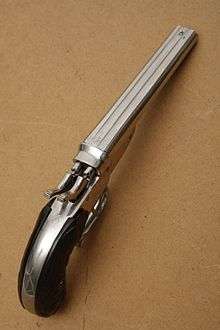Garrucha (pistol)
| Garrucha | |
|---|---|
| Type | Pistol |
| Place of origin |
|
| Production history | |
| Manufacturer |
Castilo Rossi Lerap |
| Produced | Circa 1730s-1960s |
| Specifications | |
| Cartridge |
.320 .380 .32 S&W .38 S&W .22 Short .22 Long .22 Long Rifle .32 8mm 9mm Flobert |
| Barrels |
1 2 |
| Action | Single Action |
| Sights | Iron |
The garrucha is a small pistol, similar to a derringer, common in southern Brazil and Argentina in the early 20th Century. It is usually double-barreled,[1] though with the barrels side-by-side rather than vertical as is common in American derringers, and the bores can be rifled or smooth.
In Brazil, the most popular chamberings were for the .320 and .380 centrefire cartridges, similar to the .32 S&W and .38 S&W in appearance, but conical. They were also chambered for the .22 Short, .22 Long, .22 Long Rifle, and the .32, 8mm, and 9mm Flobert cartridges, among others.
These types of pistols were popular from 1930-1960 due to their low cost and small size, and were associated with the gauchos (cowboys) of the South American pampas.
In Brazil, Garruchas were produced by Castelo, Rossi, and Lerap.

References
- ↑ Smithsonian Institution. Institute of Social Anthropology (1951). Cruz das Almas, a Brazilian village. U.S. Government Printing Office. p. 222.
Further reading
- Belgian Garrucha Pistol & Garden Guns on Curator's Corner, NRA Blog, January 12 2012 19:03